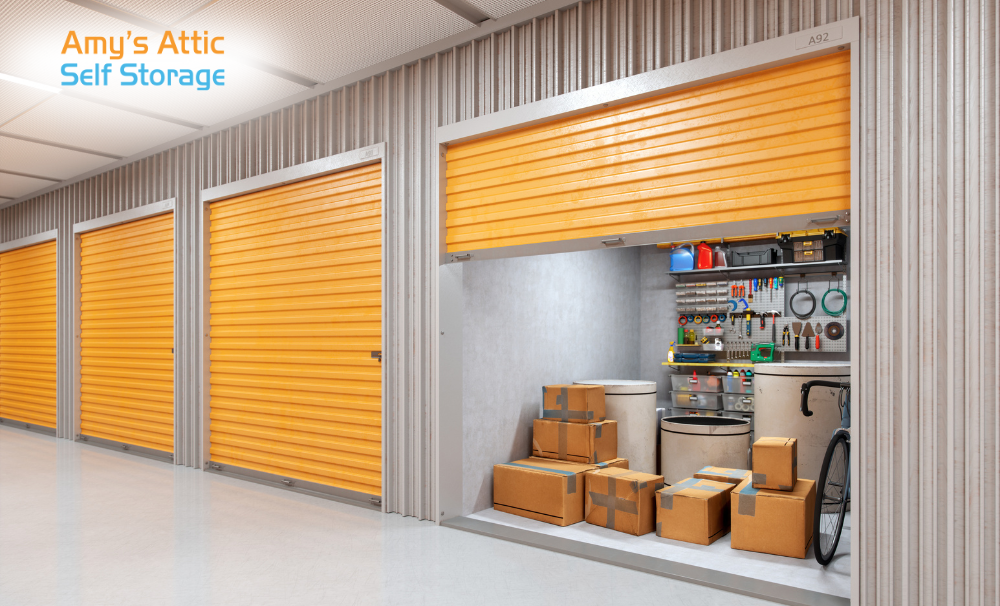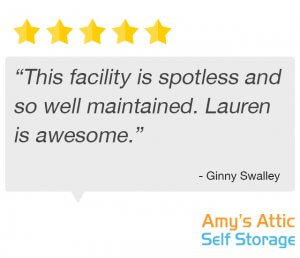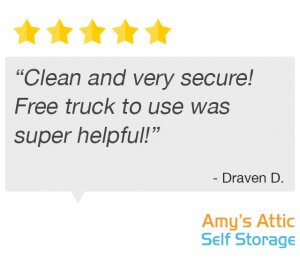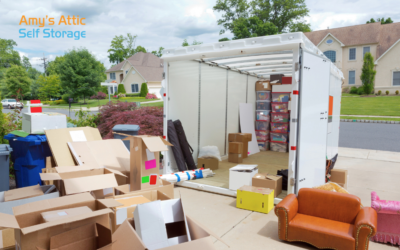Storage units are an excellent option for anyone who needs additional space to put items away at various stages of their life. When renting a storage unit, it’s essential to understand what items you can and can’t store. Storing prohibited items brings with it a range of potential risks and consequences, including damage to your belongings or being banned from using a facility again in the future. Keep in mind that rules may vary by company and local laws, but our guide today covers the general dos and don’ts of using a storage unit. Always ask about storing any items you are unsure about ahead of using a unit to avoid issues further down the line.
What You Can Store in a Storage Unit
There is a massive list of items that you can typically store in a storage unit. By moving these items into storage, you can free up space in your home or workplace. These are some of the most commonly accepted items:
- Furniture – couches, tables, and mattresses.
- Appliances – washers, dryers, and microwaves can be stored, but they must be clean and dry.
- Boxes of Personal Items – books, clothing, and décor are all options for storage boxes.
- Electronics – TVs, computers, and gaming systems are suitable for storage, but should be in climate-controlled units.
- Seasonal Items – such as holiday decorations, camping gear, and winter or summer wardrobes, you don’t need access to all year round.
- Business Inventory – documents, tools, and supplies for your business can be stored, but make sure you check your insurance and contract limits.
- Vehicles (at approved facilities) – cars, motorcycles, and small boats, but these almost always need to be registered and insured.
When storing approved items in boxes, make sure you select sturdy boxes that can handle the weight of the items. Label everything clearly to make access easier later on when it’s time to get your belongings out again.
What You Can’t Store in a Storage Unit
While there is a long list of items that you can store in a storage unit, there are also items that are prohibited or hazardous. Avoid storing any of these items in a storage unit and find a more suitable option for storing or disposing of them:
- Perishables or Food – anything that can attract pests and mold is not allowed in storage units.
- Living Things – plants, animals, or people (seriously!). Using storage units as bedrooms or living spaces is against the law.
- Hazardous Materials – paint, gasoline, propane tanks, fireworks, and chemicals aren’t allowed in most facilities, due to the fire and safety risks they pose.
- Illegal Items – stolen goods, unregistered firearms, and illicit substances.
- Unregistered Vehicles – some facilities require proof of insurance or title to store them.
- Wet Items – any items put in storage with moisture present can lead to mold or water damage.
Storing prohibited items in a storage facility can result in the termination of your rental agreement or even legal action. These consequences are why you should always read the terms and conditions very carefully before putting items into storage, and ensure you ask any questions about items you are unsure about.
Special Cases – Please Ask First!
There are some special cases and situations where you may be allowed to store items that you might not expect would be allowed in storage units. If you are unsure about the items you plan to store and whether they are allowed, always ask staff members at the storage unit for permission first to avoid any issues. These are a few examples of items that certain circumstances may permit:
- Weapons and Ammunition – These are often prohibited or require special permission.
- High-value Items – Jewelry, collectibles, and cash may not be covered by standard insurance, and you should always declare these before being put in storage.
- Medical equipment – While medical equipment is usually allowed, it must be clean and safe to store. Chemicals and flammable substances are unlikely to be permitted in storage units.
How to Prepare Items for Safe Storage
Now that you know what you can and can’t put in a self-storage unit, you’ll want to make sure you prepare all of your belongings carefully to avoid damage. Make sure you clean and dry all items before storing them away to prevent mold and deterioration when you need to store them for an extended period of time. Plastic bins are the best storage containers for long-term storage and will ensure the preservation of these items in the condition they were in when initially stored inside the unit. Once you’ve put your items into storage containers, make sure you label each container and arrange your belongings in a way that makes the more commonly used items easier to access.
Avoid over-packing boxes to prevent damage to the boxes and the items within them. While it can be tempting to store as much as possible in a small unit, consider upgrading to a larger unit to protect your belongings better. To help improve airflow and organization in the unit, use pallets or shelving to enhance accessibility. You should place items you don’t need for a while toward the back of the unit, and those you need easy access to closer to the entrance, so that you can reach them in a rush.
Before committing to a self-storage unit, familiarize yourself with the facility’s rules and regulations to ensure you store only what is safe and legal. Each company has its own terms and conditions of storage, so always reach out to them in advance to discuss questions you have and avoid long-term issues when putting belongings into storage. Our team will be more than happy to guide you through the process of using a storage unit for the first time and discuss any concerns you have about what you can and can’t store in a storage unit.
Are your items storage-friendly? Contact Amy’s Attic Self Storage today, and we’ll help you find the perfect solution.







